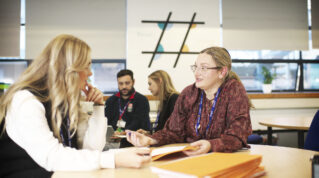Whilst the publicity might not be on the same level as the Olympics, WorldSkills is a landmark event for those who study and deliver vocational and technical qualifications and training.
Held every 2 years, 1,500 competitors from more than 65 countries and regions around the world will travel to Lyon to compete in 62 skill categories. From Renewable Energy, Health and Social Care to Electronics; WorldSkills Lyon 2024 will give these young competitors the opportunity to showcase their skills and share their passions with the judges and hundreds of thousands of visitors.
This year, Pearson is sponsoring the UK team on their journey to Lyon. Why are we partnering with WorldSkills UK in 2024? In short, we believe the conversation about the future of jobs and skills has never been more important – or more urgent.
Mind the gap – what the data tells us
Pearson is already working to help employers and employees understand the challenges and opportunities ahead through our own Skills Outlook series, which provides vital insight into the immediate needs of the modern workforce to help employers and employees stay relevant and adaptable for the long term.
Recent findings include a deep dive into Power Skills – the human skills that will be most in demand in the future, feedback from employees on how they are preparing for the future of work and most recently a global look at the impact of generative AI on the workforce.
Last year we also published our own Pearson Skills Map of England. Looking at nine regions, we explored which jobs are expanding and declining across different sectors. We also looked at the current skills in demand from employers, as well as those growing in importance. The vision being that if we know that regional workforces are facing significant technological change, localised insights can help us to navigate this.
The Skills Outlook findings give us a glimpse into a possible future. But that future is not decided. The insights give us a chance to shape outcomes. And this means that all is still to play for. The data tells us that people can improve their employment prospects by acquiring the right skills. This is only going to happen if we raise the profile of skills and the vocational learning route.
A future for every learner
The WorldSkills movement promotes and celebrates the world’s most technically skilled young people. One of the event’s key missions is to gather the latest global best practice in skills – insight that we can all use to build better qualifications and progression routes for every kind of learner.
Our BTEC qualification alone has been providing learners with a clear route into employment and further and higher education for 40 years. But the world of work is constantly changing. In response, all learning providers must evolve their products and services to best meet the needs of educators, learners, and employers.
WorldSkills champions and shines a light on emerging skills – the ones employers say they really want – and gathers data on how to execute them well. Pearson is actively developing qualifications in subjects like sustainability and robotics through its BTEC and Apprenticeship programmes – some of the very best practices that will be showcased in Lyon this September.
The power of recognition
The WorldSkills competition, above all, is about recognition. And recognition is powerful. As an awarding organisation, we are at the heart of recognising academic achievement. But events that champion and celebrate skills excellence are rarer.
Pearson is passionate about raising the profile of skills and inspiring the next generation to consider a vocational route. We are passionate about employer engagement and helping employers develop a talent pipeline so they can grow their businesses. We are passionate about increasing awareness and recognition of the skills agenda with our politicians and policymakers, and we are passionate about promoting skills-based learning – wherever it happens in the world.
The Olympic motto translates as “Faster, Higher, Stronger – Together.” Events such as WorldSkills give us the opportunity to come together to promote the skills agenda and take vocational and technical education higher. The faster we do that – the more quickly our economies, our businesses and the workforce of tomorrow will benefit.
Learn more about our partnership with WorldSkills UK

















Your thoughts